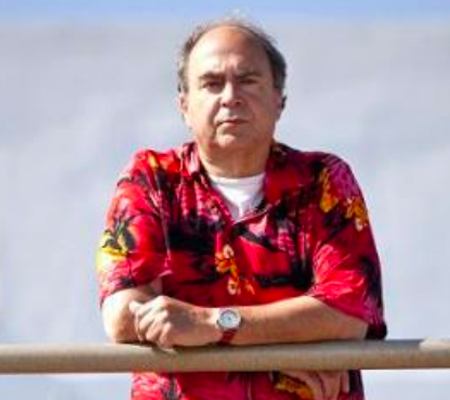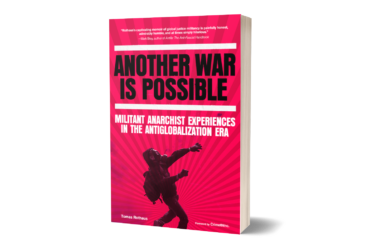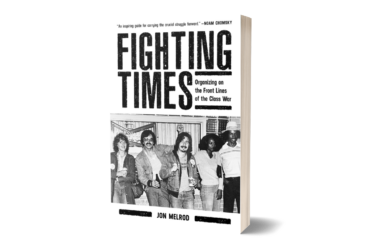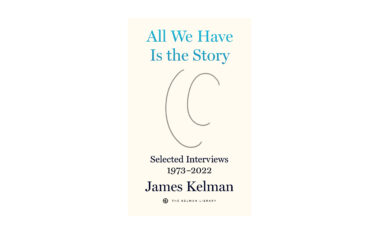By Emma Bartholomew
Hackney Gazette
21 November, 2010
Acquitted
Stoke Newington Eight member, anarchist Stuart Christie, who tried to
blow up Spanish dictator General Franco aged 17, talks to Emma
Bartholomew about how he found last week’s political protests
“reassuring” and a forthcoming autobiographical film.
Acquitted
Stoke Newington Eight member, anarchist Stuart Christie, who tried to
blow up Spanish dictator General Franco aged 17, talks to Emma
Bartholomew about how he found last week’s political protests
“reassuring” and a forthcoming autobiographical film.
The education riots at Tory HQ Millbank last Wednesday, for which 57 people have been arrested, has brought “direct action” politics to the forefront.
Christie himself was arrested in 1972, along with the “Stoke Newington Eight,” for having taken part in Britain’s first urban guerilla group The Angry Brigade – blamed for 25 bombings against the British Establishment.
Christie, who was acquitted of any
involvement in the conspiracy, says he finds it “reassuring that people
can still get angry about politics.”
“It shows that plus ça
change – times change, but the focus points of protest and anger are
still there, and when you push people hard enough and they are angry
enough, they become frustrated and take direct action.”
“It’ll be
interesting to see how that growing anger develops – and manifests
itself,” said the 64-year old who now lives in Hastings on the south
coast.
“Every generation finds its own way.”
In 1971-1972, The Angry Brigade targeted what the radical left regarded as symbols of capitalist repression – banks, embassies, the 1970 Miss World event, homes of Conservative MPs, corporations and government offices.
No one was killed, although one person was slightly injured – but the security breaches were a serious embarrassment to Edward Heath’s government.
After a lengthy investigation, on August 20 1971 a police squad raided the upstairs flat of 359 Amhurst Road, inhabited by four university “dropouts” – John Barker, Jim Greenfield, Hilary Creek and Anna Mendleson – and couldn’t believe their luck.
They
allegedly found a small arsenal of weapons and explosives and a John
Bull children’s printing set, which had been used to authenticate Angry
Brigade press releases.
Police hid out in the house and arrested two more suspects the next day, activist Chris Bott and anarchist Stuart Christie.
In the following months, dozens of arrests were made, but only two people were linked to the six already arrested, art student Kate McLean, and telephonist Angela Weir, better known as Angela Mason OBE, director of the gay equality group Stonewall.
The group became known as the Stoke Newington Eight, and the longest trial in British history ensued, lasting over six months.
Barker, Mendleson and Creek, all younger than 24, chose to conduct their own defences, and the group succeeded in casting serious doubt on most police evidence against them – including the Amhurst Road arsenal, which they claimed was planted.
During their trial, protests were held asking for the release of the Stoke Newington Eight thousands of badges were sold saying, ‘I’m in the Angry Brigade.’
None of the defendants were ever convicted of planting explosives – but the four Amhurst Road’s residents received 10 year sentences for ‘conspiring to cause explosions likely to endanger life or cause serious injury to property’.
In a review of a book about the Angry Brigade, John Barker since wrote, “In my case, the police framed a guilty man.”
A collective vow of silence was taken by those involved in the trial, still upheld this week by Christie, who would only describe the period as “interesting.”
The Glaswegian has certainly had a colorful life, and his life story is set to be told in a film next year.
In 1964 aged 17, he was arrested in Spain carrying explosives, on his way to assassinate General Franco.
“That’s what 17-year olds do, it’s when people tend to do radical things and become immersed in radical politics, when they have fire in their bellies and in their hearts – and at that time there seemed a different possibility,” he explained.
“The political scene was shaking, and it seemed as though it needed a final push, and it almost succeeded – but you win some and you lose some.
“It was an educational experience, and it stood me in enormous good stead in terms of learning about people and things, like that life wasn’t black and white,” he added.
In his autobiographical book, My Granny Made Me An Anarchist, Christie talks about his earliest influence, who inspired him with her “ideas of injustice and doing the right thing.”
The follow-up, General Franco Made Me A Terrorist, tells of the three and a half years he spent inside Spanish gaol, where he was trained in printing.
“It was a stupid thing for them to do because anarchists were always involved in printing, ever since the 19th century,” he said.
He continues his anarchist struggle through the written word nowadays, and he has his own publishing house, ChristieBooks.
“My main focus is on writing and publishing and educating, raising consciousness and awareness of a different perspective,” he said.
He was instrumental in getting Gordon Carr’s comprehensive account, The Angry Brigade – first published in 1975 – republished this year by PM Press.
Christie is sceptical society has seen any improvement since the Angry Brigade’s time: “Things are just the same as they ever were, there’s no change and basically there’s no final solution, there’s will always be something to struggle against.”





